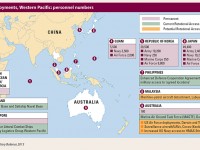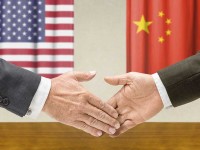Wu Zhenglong, Senior Research Fellow, China Foundation for International Studies
Sep 20, 2016
The TPP is an important piece of Obama’s strategy of rebalancing to the Asia-Pacific region, and also one of the most important political legacies he’s tried to build before leaving the White House. Any delay in approving the TPP will deal a heavy blow to the US rebalance to the Asia-Pacific region, but faced with the political reality of the US elections, a rethink will be in order.
Edward Linczer, Research Associate, American Enterprise Institute
Aug 26, 2016
Security assistance is a tangible means of bolstering partner nations’ ability to fend off Chinese maritime coercion. If the U.S. truly seeks to shift its strategic weight to the Asia-Pacific, it must consider ways to rebalance its security assistance programs to enable its maritime Southeast Asian partners, as they defend the front lines.
He Yafei, Former Vice Minister of Foreign Affairs
Aug 16, 2016
Asia is famous for its multiple civilizations and their core value systems that have guided Asian nations since ancient times. Recent decades have seen China making great contributions to regional economic growth and unity with its peaceful and rapid development. Common development will always be the hallmark of this great region.
Cui Liru, Former President, China Institutes of Contemporary International Relations
Aug 10, 2016
China believes that it can cultivate a relationship with the U.S. based on peaceful co-existence. However, the South China Sea is proving a collision point between U.S. hegemony and Chinese interests in safeguarding its own security and development.
Wu Sike, Member on Foreign Affairs Committee, CPPCC
Jul 22, 2016
China’s diplomatic ideal is to establish an international relationship where countries treat each other on equal footing and work together for common security, mutual benefit and joint development. China does not challenge anybody else but does not fear any challenge either, and will not allow its core interests to be jeopardized. Pursuing peace, cooperation and joint development is the only right way to follow.
Clifford Kiracofe, Former Senior Staff Member, Senate Committee on Foreign Relations
Jul 14, 2016
The empire perspective thinks in hegemonic terms and emphasizes military power. The republic perspective thinks in multipolar terms and emphasizes diplomacy. These two perspectives are active in both the Democratic and Republican parties. In both parties, however, the empire perspective is dominant. Would a Trump presidency mean a continuation of the Pivot to Asia?
Mike Ross, Former U.S. Representative for Arkansas’s 4th District
Jul 07, 2016
Amid rising tensions in the South China Sea and an impending ruling at The Hague, China will attend the U.S.-hosted RIMPAC 2016 naval exercise, signaling that the vital signs of the U.S.-China relationship remain intact and will be crucial to confronting the global challenges ahead of us.
Fan Gaoyue, Guest Professor at Sichuan University, Former Chief Specialist at PLA Academy of Military Science
Jun 29, 2016
As a self-labeled world leader, the US should abandon its provocative and destabilizing air and sea exercises in the South China Sea – and sign and abide by UNCLOS wholly and thoroughly instead of citing a few isolated words and phrases to serve its purpose.

Ted Galen Carpenter, Senior Fellow, Randolph Bourne Institute
Jun 21, 2016
Washington’s efforts to strengthen bilateral security alliances with East Asia and Pacific nations give credence to China’s suspicions of a containment policy directed against China’s growing economic and military capabilities. However, China may be looking to Latin America to offset U.S. attempts for primacy in Asia.

Yin Chengde, Research Fellow, China Foundation for International Studies
Jun 07, 2016
China has no ambition to dominate Asia or the world, and Washington must resist misconstruing China’s development strategies and policies. It is imperative that the two countries dispel misgivings and strengthen communication, deepen understanding and mutual trust, in order to build a new type of major-country relations featuring non-confrontation, non-conflict and win-win cooperation.
Back to Top

- China-US Focus builds trust and understanding between the U.S. and China through open dialogue among thought leaders.
- Our Offerings
- Topics
- Videos
- Podcasts
- Columnists
- Research Reports
- Focus Digest
- Stay Connected
-
Thanks for signing up!
- Get the latest stories from China-US Focus weekly.